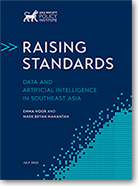Consolidated Research & Statistics
Breakdown of STEM Professionals by Gender
Participation in International Standards-Setting Bodies
Government AI Readiness Index 2021
Data Centers in Southeast Asia
Data Protection Laws and National AI Policies
MSME STATISTICS
Micro, Small, and Medium Enterprises (MSME) make up an overwhelming majority of businesses in each of the five countries studied in this report. As a result, they are often a key constituency of governments’ digitalization efforts. In this section, we delve deeper into the key facts and figures of MSMEs in Southeast Asia.
Indonesia
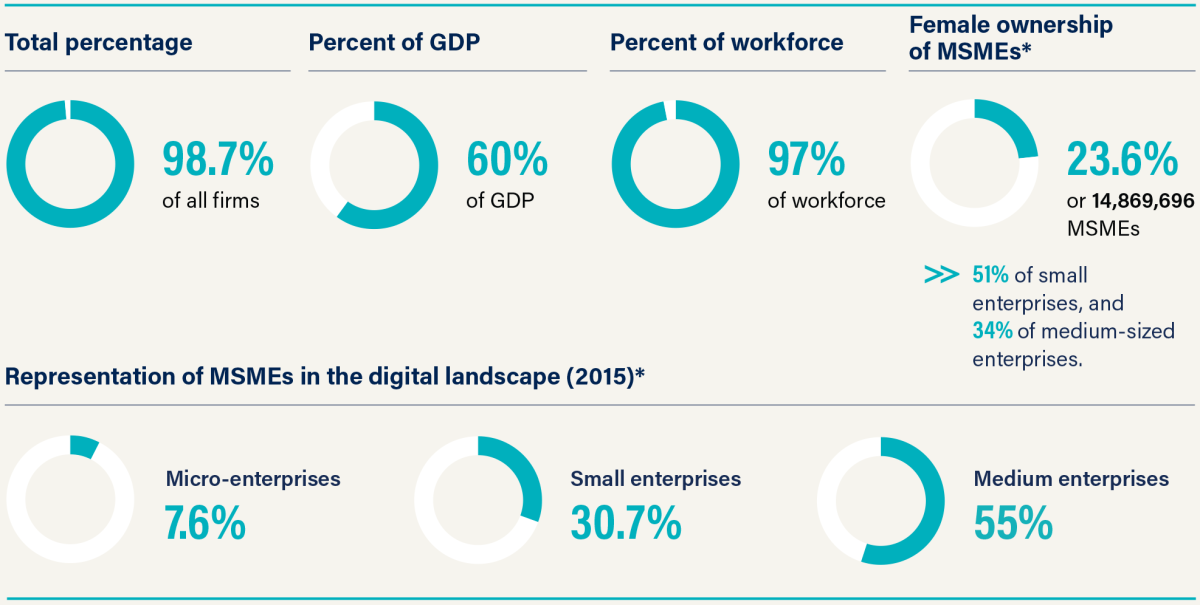
Malaysia

“Only about one in three businesses in Malaysia has implemented digital transformation strategies, while less than one in four businesses has a dedicated digital strategy team. Malaysia also has “fewer businesses with websites, and fewer secure servers than per capita income would predict” compared to other countries. As of 2017, only 37.8% of business establishments in Malaysia have a web presence.”
* Lacking data on intersection of ownership by gender and digital presence of MSMEs
Singapore
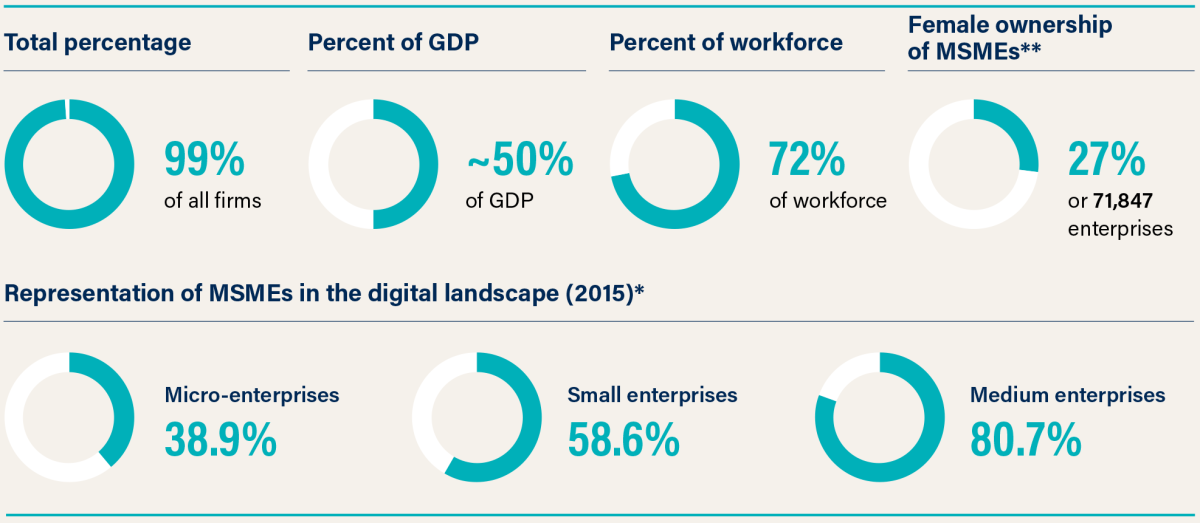
Thailand
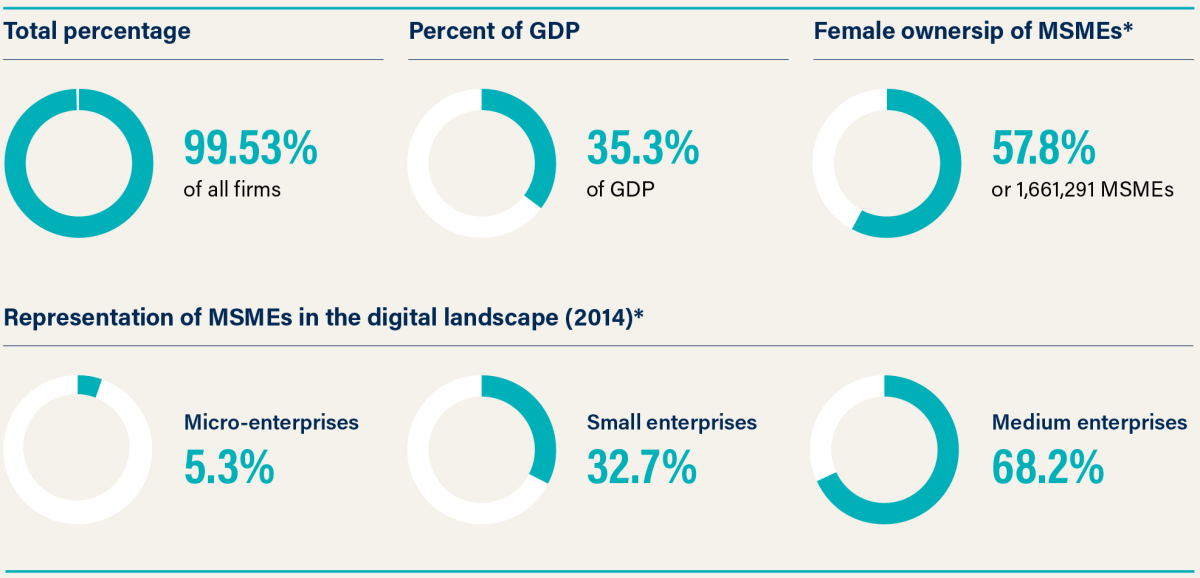
* Lacking data on intersection of ownership by gender and digital presence of MSMEs.
** Lacking information on MSMEs specifically.
Viet Nam
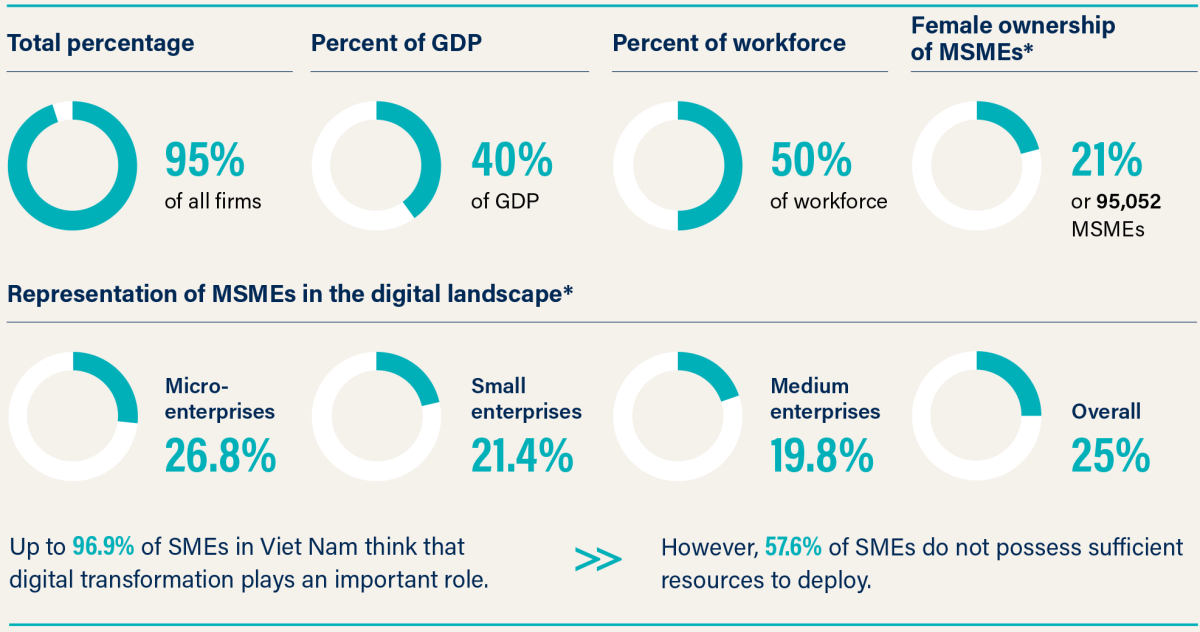
* Lacking data on intersection of ownership by gender and digital presence of MSMEs
Sources
Indonesia
Female ownership of MSMEs available at: www.smefinanceforum.org/data-sites/msme-finance-gap; and www.ifc.org/wps/wcm/connect/260f2097-e440-4599-91ec-e42d45cf3913/SME+In….
Representation of MSMEs in the digital lansdscape in Table “Core indicators on ICT use in business by enterprise size class, annual, 2003–2016”, Indicator “Proportion of businesses with a web presence” available at: https://unctadstat.unctad.org/wds/ReportFolders/reportFolders.aspx.
Malaysia
Female ownership of MSMEs available at: www.smefinanceforum.org/data-sites/msme-finance-gap.
Representation of MSMEs in the digital lansdscape available at: https://techwireasia.com/2021/06/smes-in-malaysia-stilllag-in-digital-a….
Singapore
Female ownership of MSMEs available at: www.accenture.com/_acnmedia/PDF-135/Accenture-Businesseswomen-GrowEcono….
Representation of MSMEs in the digital lansdscape in Table “Core indicators on ICT use in business by enterprise size class, annual, 2003–2016”, Indicator “Proportion of businesses with a web presence” available at: https://unctadstat.unctad.org/wds/ReportFolders/reportFolders.aspx.
Thailand
Female ownership of MSMEs available at: www.smefinanceforum.org/data-sites/msme-finance-gap.
Representation of MSMEs in the digital lansdscape in Table “Core indicators on ICT use in business by enterprise size class, annual, 2003–2016”, Indicator “Proportion of businesses with a web presence” available at: https://unctadstat.unctad.org/wds/ReportFolders/reportFolders.aspx.
Viet Nam
Female ownership of MSMEs available at: www.smefinanceforum.org/data-sites/msme-finance-gap.
Representation of MSMEs in the digital lansdscape available at: https://mekongbiz.org/wp-content/uploads/2017/07/WOB-Position-Paper_Eng…; and https://vir.com.vn/over-575-per-cent-of-vietnamese-smes-struggle-with-d….
ICT index and average % of internet and website adoption by enterprises in each province can be found at: https://m.mic.gov.vn/Pages/TinTuc/143252/Bao-cao-Vietnam-ICT-Index.html (reports are in Vietnamese, will require translation.) 2015 figures from the same index can be found in English at: www.tandfonline.com/doi/full/10.1080/02681102.2021.1935201 (table 2).
BREAKDOWN OF STEM PROFESSIONALS BY GENDER
The presence of science, technology, engineering, and mathematics (STEM) professionals is critical for an economy invested in data-driven technologies like AI. It is also important to understand the gender breakdown of STEM professionals to ensure that the conceptualization, design, and deployment of those technologies adequately reflect the unique needs, priorities, and perspectives of both women and men.
Female Share of STEM Tertiary Graduates 2018-2020
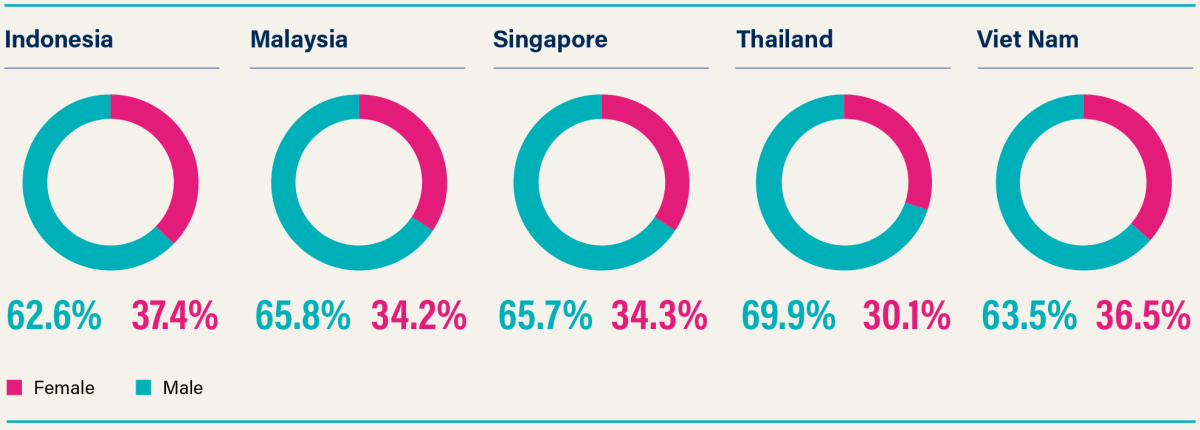
Proportion of Researchers in STEM by Gender 2015-2019
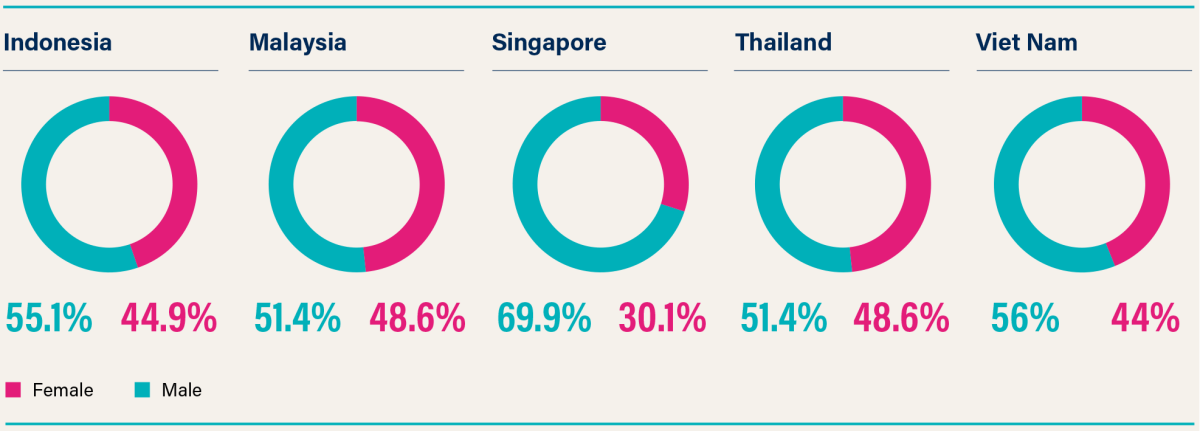
Sources
Female share of STEM tertiary graduates, available at: https://databank.worldbank.org/id/2ddc971b?Code=SE.TER.GRAD.FE.SI.ZS&re…;
Proportion of researchers in STEM by gender, available at: https://bangkok.unesco.org/content/complex-formula-girls-andwomen-scien…;
Science, technology and innovation: Researchers by sex, per million inhabitants, per thousand labor force, per thousand total employment (FTE and HC), available at: data.uis.unesco.org.
DISABILITY STATISTICS
Technology should enable and empower persons with disabilities (PWDs) to realize their full potential and live a life of dignity. Although many countries have dedicated policies for PWDs, like many other minority groups, PWDs do not always receive mainstream consideration in data-driven national policies. This can result in practical shortcomings or worse, bias and discrimination, when technological innovations for public services are rolled out.
Indonesia*

* Concerns have been raised about the lack of data Indonesia has on PWD, see: www.asiasentinel.com/p/indonesia-disability-issues-lack-data?s=r.
Malaysia

Singapore

Thailand
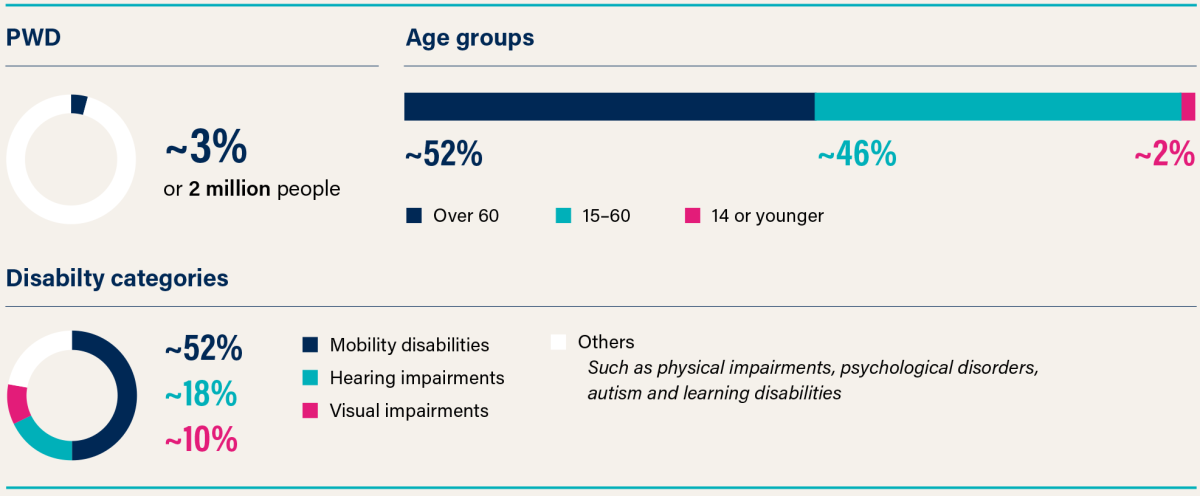
Viet Nam

PARTICIPATION IN INTERNATIONAL STANDARDS-SETTING BODIES
Participation in the international standards arena affords not only familiarization with developments being discussed (a capacity-building measure, in itself) but also the opportunity to contribute to deliberations about the longer-term rules of the road for a particular field. Simply being present in these forums can nurture agency and prepare countries’ for more involved discussions later on.
Technical standards-setting bodies on data and AI include the International Organization for Standardization (ISO) and the International Telecommunication Union (ITU).
Country Participation
Indonesia
Full member of ISO
Observing member of ISO/IEC JTC 1/SC 42: The international standards committee responsible for standardization in AI
Member state of ITU
Malaysia
Full member of ISO
Not a member of ISO/IEC JTC 1/SC 42: The international standards committee responsible for standardization in AI
Member state of ITU
Singapore
Full member of ISO
Participating member of ISO/IEC JTC 1/SC 42: The international standards committee responsible for standardization in AI
Member state of ITU
Thailand
Full member of ISO
Not a member of ISO/IEC JTC 1/SC 42: The international standards committee responsible for standardization in AI
Member state of ITU
Viet Nam
Full member of ISO
Not a member of ISO/IEC JTC 1/SC 42: The international standards committee responsible for standardization in AI
Member state of ITU
GOVERNMENT AI READINESS INDEX 2021
This table is drawn from the Oxford Insights’ Government AI Readiness Index, which is now in its fourth edition. The index draws on 42 indicators across 10 dimensions in the areas of Government, Technology Sector, and Data and Infrastructure, in order to answer the question: “How ready is a given government to implement AI in the delivery of public services to their citizens?” The scores are calculated out of a total of 100.
Government AI Readiness
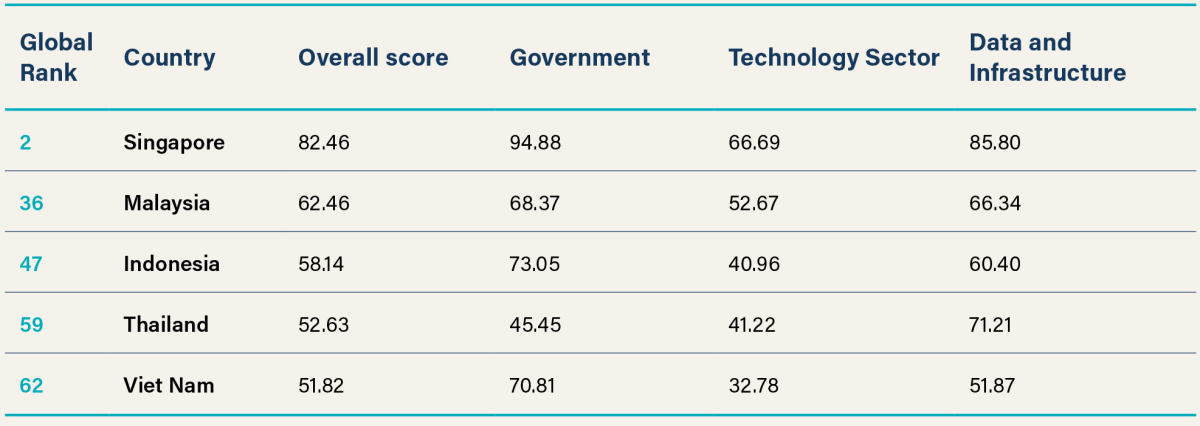
DATA CENTERS IN SOUTHEAST ASIA
The increasing number of data centers in Southeast Asia points to an expected growth of the data industry, supported by long-term capital investment to facilitate that expansion. However, the amount of energy needed to power the operation of these data centers can have potentially detrimental effects on the environment — including community displacement — without proper planning.
Number of Data Centers by Country
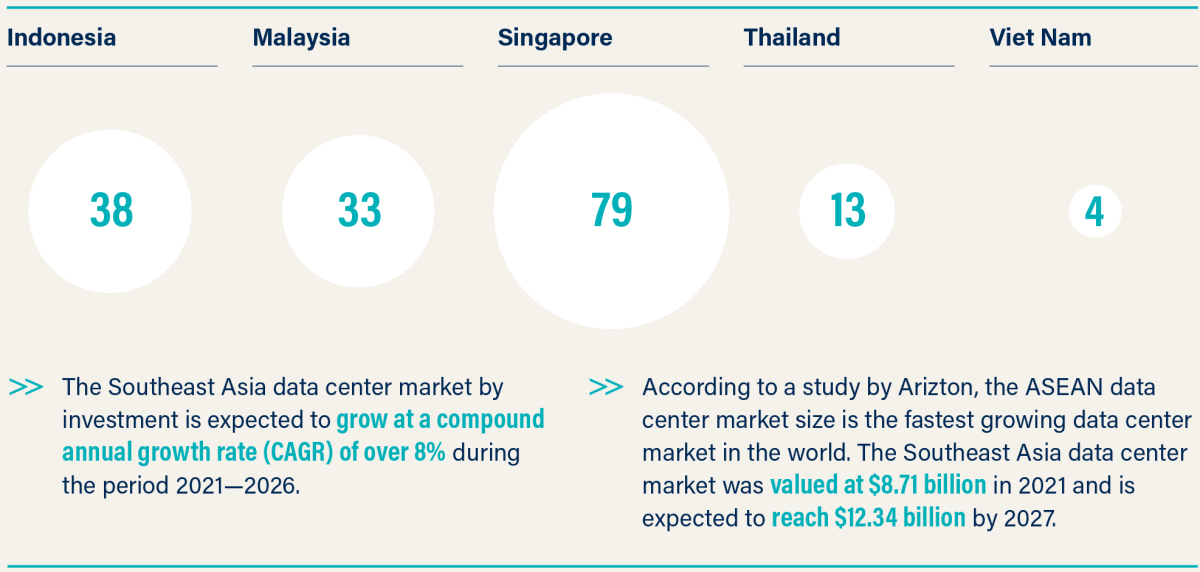
Sources
www.businesswire.com/news/home/20210427005613/en/Southeast-Asia-Data-Ce…- Forecast-2021-2026-Featuring-Key-IT-Infrastructure-Providers-Support-Infrastructure-Providers-Contractors- Investors---ResearchAndMarkets.com.
https://www.globenewswire.com/news-release/2022/03/09/2400274/0/en/Sout…- to-Reach-12-34-Billion-by-2027-Around-2-3-Million-Sq-Ft-of-Data-Center-White-Space-to-be-Added-Arizton.html.
DATA PROTECTION LAWS AND NATIONAL AI POLICIES
This table is a comparative and shorthand depiction of data protection-specific laws and their status in each of the five countries, as of June 2022.
Indonesia
Data Protection Law
- Personal Data Protection Bill
National Artificial Intelligence Policies
- National Strategy for Artificial Intelligence (2020–2045)
Malaysia
Data Protection Law
- Personal Data Protection Act 2010
National Artificial Intelligence Policies
- Malaysia AI Blueprint (2019)
- NationalAIRoadmap (drafted December 2020–March 2021)
- National AI Framework for Malaysia (yet to be released)
Singapore
Data Protection Law
- Personal Data Protection Act 2012
National Artificial Intelligence Policies
- National AI Strategy (launched 2019)
- The Model AI Governance Framework (released 2019)
Thailand
Data Protection Law
- Personal Data Protection Act 2019
National Artificial Intelligence Policies
- AI Ethics Guidelines (drafted 2019)
- National AI Master Plan (2021–2027)
- National AI Strategy (draft released 2022)
Viet Nam
Data Protection Law
- Draft Personal Data Protection Decree
National Artificial Intelligence Policies
- National Strategy for Artificial Intelligence Research, Development and Application through 2030 (2021)

